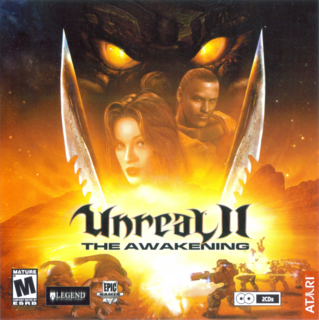Unreal II: The Awakening is as good as its length, and the absence of a multiplayer mode makes things even worse.
First of all, do not expect Unreal II to be a faithful sequel to the original Unreal (plus 'Return to Na Pali' expansion). You don't play with a nameless character anymore, the action is more sporadic, the gameplay is very slow, the game ends pretty quickly... but the Razzie Award goes to the multiplayer, simply because you don't have it. At least, a free multiplayer mod (XMP - eXpanded MultiPlayer) is available to download, but still isn't as good as the original Unreal, mainly because there isn't Cooperative mode. But Unreal II actually does have a few better qualities than its antecessor, starting with the graphics (obviously, this sequel came five years later) and ending with some unique and satisfying moments.
The story, as you can usually expect from a First-Person Shooter, isn't too complex. You play as Dalton, an ex-marine who is now traveling through the space, away from any real action. The game starts with Dalton speaking with his superior, just after requesting to go back to the marine squad. His request was denied, but he's called back into action to retrieve seven artifacts to forge a powerful weapon. There is also some dialogue, especially when you're on your ship, talking with the only three people (aside Dalton) that form the crew: Aida shows the mission briefing, Isaak gives information about your weapons, and Ne'ban, an alien who is a very experienced pilot. You can walk in your ship between some missions and make those conversations, but it's pointless. There is no real important stuff to force you waste your time with that, especially when talking to Ne'ban. But Isaak actually does have some relevant information, simply because he talks about what really matters: using your weapons.
After the mission briefing, you can go to your personal ship and land on the destination planet. Unreal II starts very slow and boring, but it gets better as you accomplish your first four or five missions. That's the problem. The game has only 12 missions, so approximately 40% of its length is wasted with tedious action sequences. And everything gets worse because your character moves very slowly. But when the game is good, it's really good. Some levels you have to give orders to your soldiers, build a defense using force walls and auto turrets, entering in a bizarre alien planet, or breaking into a well-defended fortress. In addition to that good stuff, most of the weapons are OK. The assault rifle, although it sounds weak, it's very useful in most situations; the shotgun is extremely dangerous at close distances; the sniper rifle, despite its weird looking, is very powerful at long distances or to take down humans with a head shot. There're more good weapons, like the rocket launcher and the flamethrower, but I found those first ones the real deal. Unfortunately, the Magnum (called 'Grace'), one of your most deadly weapons, has very few ammo and you'll probably soon forget to use it.
The new graphics engine can render impressive outdoor environments, and everything looks great: mountains, water, shadows, lightning, character models, weapons (mostly) and special effects. The sound is OK and the music is similar to Unreal Tournament 2003/2004, which isn't a bad thing. Also, the scenarios are very convincing and variety, so Unreal II can be an immersive game and will easily put the player into the context.
Sadly, considering all the above qualities, most of your enemies have a poor Artificial Intelligence, which makes the gameplay uninteresting. Apparently, the developers didn't know exactly what to do with this game: a First-Person Shooter with fast-paced action and mindless enemies (at least close to the original Unreal), or a slow and tactical Shooter with smart opponents? Well, they did a mix that isn't good, since Unreal II is slow-paced and the enemies are usually brainless. Nevertheless, the default difficult setting does a good job when offering challenges to the player, but nothing that's too punishing, maybe because there aren't many targets to shoot at.
If that wasn't enough, the levels and missions are very straight, and you don't have anything to do that isn't doing your job. I mean, the maps are short and there are no optional places to visit, so this linearity suddenly becomes a problem. The game lasts only 8 to 10 hours, and it could be even less if your character wasn't so slow when moving around. It's noticeable that Unreal II: The Awakening had a great potential, but the developers decided to release this game (perhaps before its time) with a very short single player and no native multiplayer to speak about.

